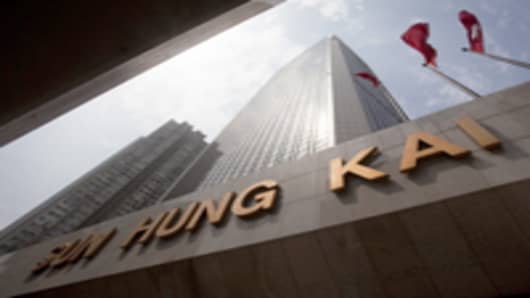News that Sun Hung Kai’s billionaire co-chairmen have been charged for bribery has cast a pall over the stock and prompted a downgrade from Barclays on Monday, as investors continue to weigh the extent of the fallout from the scandal on Asia's largest developer.
Barclays, which has an underweight position on the stock, downgraded its price target on the company to HK$87.50 ($11.25) from HK$92.16, warning that the shares could be vulnerable to heavier losses in the coming months. This represents a downside of about 7 percent from the stock’s current value.
Barclays’ call comes even as several analysts CNBC contacted maintained a buy on the stock.
“Some investors have argued that given Sun Hung Kai Properties’ hard asset business, the arrests and charging of its co-chairmen should only have a limited impact on valuation. We disagree,” says Andrew Lawrence, head of Hong Kong property research at Barclays, adding that property companies should not just be valued on their asset base, but also on the quality of the management team that operates those assets.
Sun Hung Kai shares have fallen 16.5 percent since the arrest of its billionaire owners on suspicion of corruption in March. On Friday, the co-chairmen – Thomas and Raymond Kwok – were charged with bribing a former Hong Kong government official with HK$34 million ($4.4million) in return for favors. If found guilty, the executives could face a fine of up to HK$500.000 and/or a seven year jail sentence.
Barclays argues that the prolonged trial process will reduce the involvement of the company’s two key decision makers which is likely to hurt the developer’s expansion plans.
“The company is likely to become more conservatives in the nature and size of its investments – reduced China exposure, limited further development expansion,” says Lawrence.
With Sun Hung Kai’s debt levels at their highest in the company’s history, Lawrence says it will encourage a more conservative management approach and a near-term focus on debt reduction, resulting in “significantly slower” capital return.
Concerns over corporate governance will likely to weigh on the stock as well, Lawrence added. Adam Kwok, 29, the son of Thomas Kwok, and Edward Kwok, 31, the son of Raymond Kwok, were appointed as alternate directors to their fathers on Friday.
He says this “evidence of succession planning” fails to sufficiently address the concerns of minority shareholders.
Sun Hun Kai is currently trading at a 30 percent discount to net asset value. Lawrence forecasts that the discount will widen to 37 percent if the co-chairmen were removed from working in the company.
Peter Churchouse, Chairman & MD at Hong Kong-based property investment company Portwood Capital, agrees that the appointment of Adam and Edward Kwok will cast some doubt for investors.
“Are they really equipped to be running a $32 billion market cap company at this tender age, I suspect shareholders will be a little concerned about that,” he said.
Churchouse, however, remains positive on the company overall: “It has very high quality product, a good brand, good brand recognition, an excellent land bank and runs a great balance sheet.”
Paul Louie, Regional Head of Property Research at Nomura, has a more positive outlook on the stock and is maintaining his buy call and 12-month price target of HK$112.
“It was just a matter of time before the charges were going to be filed,” Louie says, adding that he is not worried about disruptions to their investment plans.
Louie says in addition to holding some of the most desirable assets in Hong Kong such as New Town Plaza in Shatin, ICC (International Commerce Center) in West Kowloon and the APM mall, the company generates a significant portion of their earnings from a stable stream of rental income.
The company’s HK$200 billion-plus properties generate more than HK$10 billion in rental income, according to calculations by Nomura, resulting in ample liquidity.
“Provided they don’t under-invest in the assets and they don’t let them get run down, these assets will continue to generate the income,” he said.



